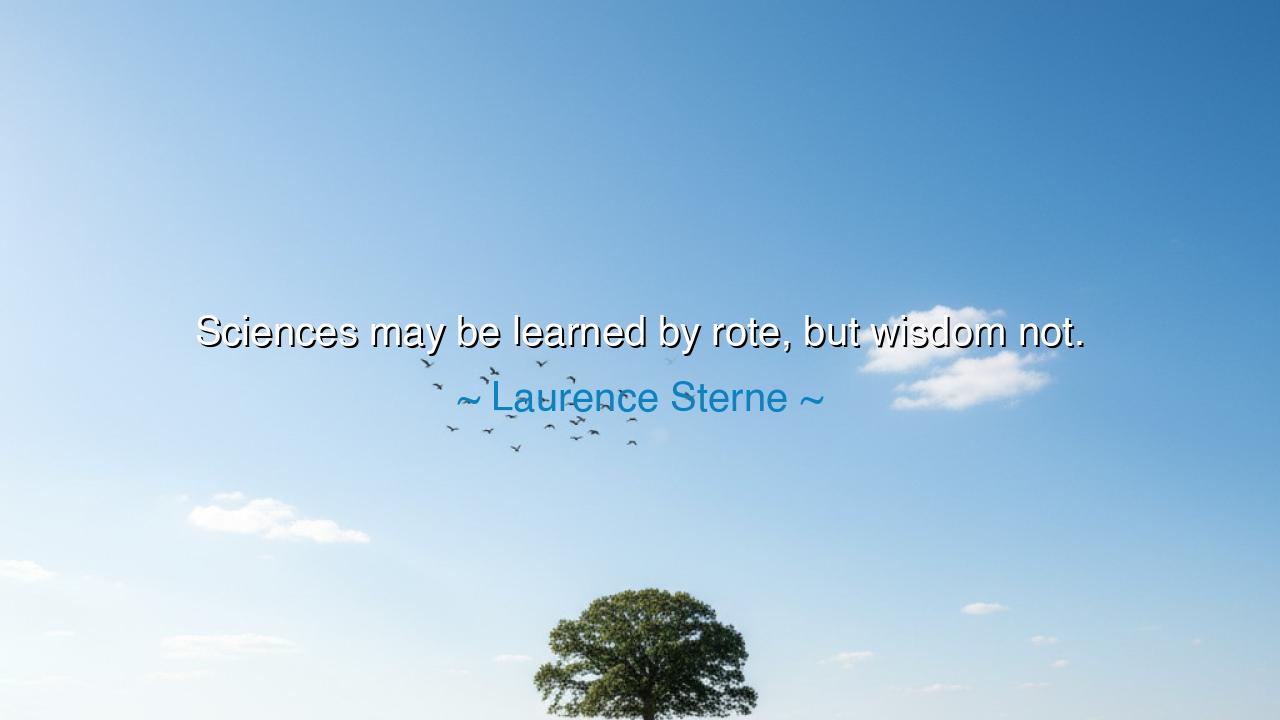
Sciences may be learned by rote, but wisdom not.






Laurence Sterne, in his eternal pursuit of understanding the human soul, declared: “Sciences may be learned by rote, but wisdom not.” In these words, he captures a profound truth about the nature of knowledge and wisdom. The sciences, with their laws, facts, and formulas, can be memorized, repeated, and applied mechanically. One can learn to calculate, to observe, and to experiment, all through the repetition of learned steps. Yet wisdom, the most elusive of treasures, is not acquired by rote. It cannot be memorized like a list of facts; it is not found in textbooks but in the soul, honed through experience, reflection, and the trials of life.
The meaning of this quote is deep and insightful. Science can teach us to master the external world, to manipulate the forces of nature with precision. Yet wisdom is not an external skill—it is a quality of the soul, a profound understanding of life’s mysteries, tempered by humility and experience. While one may know the science of a thing, true wisdom comes in knowing how to apply that knowledge with grace, understanding, and compassion. It is only through living, through the fullness of experience, that one gains the wisdom to navigate the complexities of existence.
Consider the example of Albert Einstein, whose scientific brilliance is unmatched. Yet, Einstein himself acknowledged that wisdom was something far beyond the equations he solved. Despite his revolutionary discoveries in physics, it was his later years, when he became a philosopher of life and morality, that his true wisdom shone. He understood that knowing the laws of nature, no matter how brilliantly, could never replace the deeper wisdom that comes with understanding humanity, compassion, and the nature of existence. Science may give us the ability to manipulate the world, but it is wisdom that guides us in knowing when and why we should act.
In contrast, we see the Greek philosophers such as Socrates and Plato, who spent their lives pondering not just what the world is, but how one ought to live within it. Their wisdom was not born of memorizing facts or solving problems—it came from questioning, from seeking the truth in the depths of the soul, and from learning to live with virtue. For them, wisdom was not merely intellectual; it was moral, spiritual, and lived through the character of a person.
Thus, Sterne’s words are a reminder that true greatness is not found merely in knowledge or skill but in the application of knowledge with insight, compassion, and restraint. Science may give us mastery over the material world, but wisdom is the gift that enables us to master the self, to act with discernment and justice. Wisdom grows in the fertile soil of experience, nourished by reflection, action, and the humility to admit that there are truths beyond our understanding.
Therefore, let the seeker of wisdom understand this truth: knowledge can be acquired through study, but wisdom is forged in the fire of experience. It is not enough to memorize the facts; one must live them, feel them, and learn from the consequences of each choice made. Sterne’s words remind us that the quest for wisdom is far deeper than the pursuit of knowledge—it is the journey of the soul itself.






XQdao xuan quang
This statement makes me question how society values knowledge versus wisdom. Are we too focused on quantifiable achievements and rote learning while undervaluing the subtler, less tangible aspects of insight? I also wonder if technology and easy access to information exacerbate this gap—can the abundance of data create an illusion of understanding, while true wisdom remains elusive? Perhaps cultivating patience, observation, and judgment is the antidote to relying solely on memorized information.
NTNguyet Tran
Reading this, I reflect on the difference between intellectual achievement and practical understanding. While someone may master complex scientific theories, applying them wisely requires judgment, empathy, and foresight. I wonder whether professional environments overemphasize credentials and knowledge at the expense of wisdom. Could experiential learning, reflection, and moral consideration become more central in training future leaders, scientists, and educators to ensure knowledge is applied responsibly?
SCSang cute
I feel intrigued and slightly frustrated by this idea. It highlights that factual knowledge alone does not make one wise. Does this imply that even highly educated people may lack the insight to apply their learning effectively? I also question how one measures wisdom—if it cannot be learned like science, how do we cultivate it intentionally? Perhaps mentorship, exposure to diverse perspectives, and critical thinking play key roles in this process.
HNHai Nam
This quote resonates deeply with me because it distinguishes between memorization and true understanding. You can learn formulas, dates, or scientific principles by rote, but wisdom requires reflection, experience, and judgment. I wonder how education systems might evolve to cultivate wisdom alongside factual knowledge. Can schools and universities teach discernment, ethical reasoning, and practical judgment, or are these qualities inherently developed through life experiences rather than structured lessons?